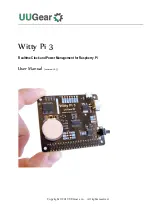
-4-
7. SYSTEM CHECKOUT
BEFORE TURNING POWER ON:
1. Check all external wiring for opens, shorts or grounds.
2. Check that transformer cables are securely connected.
3. Check the
A.C.
power wiring for proper connection.
DO NOT
connect batteries in order to
prevent sparking.
4. Check that all switches are in the normal position to the left.
8. POWER UP AND TROUBLESHOOTING
1. After completing all of the system checkout procedures, power up the panel. The
A.C. On
LED
should illuminate.
2. The
trouble
buzzer should sound intermittently, the
common trouble
LED flash, indicating
battery fault.
3. Connect the batteries carefully, observing the correct polarity.
4. The
common trouble
LED should extinguish. If the
common trouble
LED stays
on
, check the
front panel for the illumination of the following LEDs;
a) BATTERY LED - battery voltage may be too low, below 20.4V.
b) GROUND FAULT LED - indicates a ground on one or more of the extended wires.
c) ZONE TROUBLE LED - indicates an open loop or a
signal silence
switch is in the
off
normal position to the right.
d) SIGNAL TROUBLE LED - indicates an open loop or short in the signal zone.
Summary of Contents for FA-101U
Page 7: ... 5 FIGURE 1 BACKBOX FLUSH TRIM MOUNTING DETAILS ...
Page 8: ... 6 FIGURE 2 CIRCUIT BOARD LAYOUT ...
Page 9: ... 7 FIGURE 3 DETECTION AND SIGNAL WIRING INSTRUCTION ...
Page 10: ... 8 FIGURE 4 WIRING TABLE FOR DETECTION ZONE ...
Page 11: ... 9 FIGURE 5 WIRING TABLE FOR BELLS AND HORNS ...
Page 12: ... 10 FIGURE 6 ALARM AND TROUBLE RELAY CONTACTS AND REMOTE ANNUNCIATION WIRING INSTRUCTIONS ...
Page 17: ......
Page 18: ...Notes ...
Page 19: ......






































